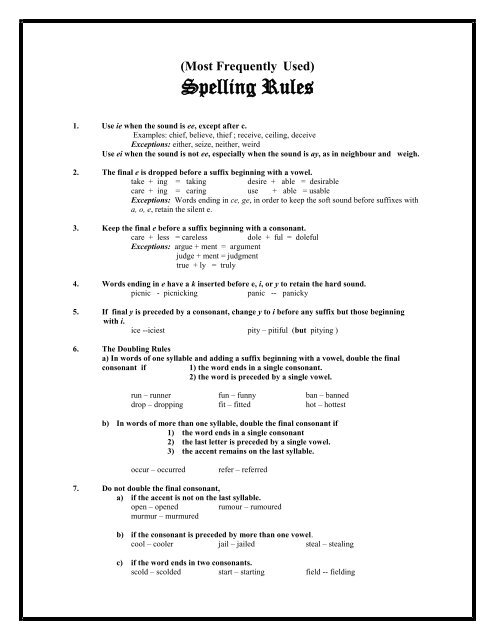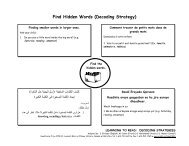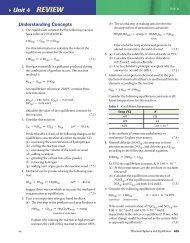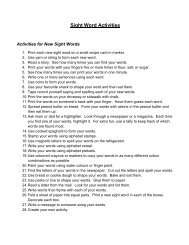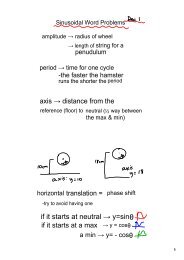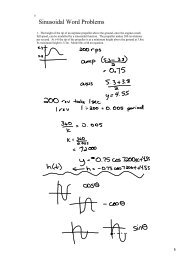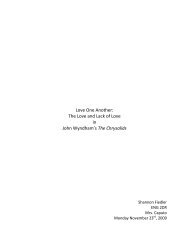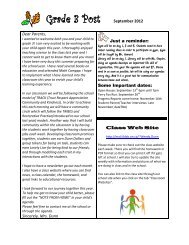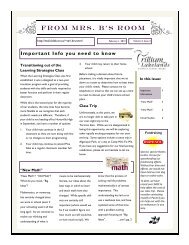Create successful ePaper yourself
Turn your PDF publications into a flip-book with our unique Google optimized e-Paper software.
(Most Frequently Used)<br />
Spelling Rules<br />
1. Use ie when the sound is ee, except after c.<br />
Examples: chief, believe, thief ; receive, ceiling, deceive<br />
Exceptions: either, seize, neither, weird<br />
Use ei when the sound is not ee, especially when the sound is ay, as in neighbour and weigh.<br />
2. The final e is dropped before a suffix beginning with a vowel.<br />
take + ing = taking desire + able = desirable<br />
care + ing = caring use + able = usable<br />
Exceptions: Words ending in ce, ge, in order to keep the soft sound before suffixes with<br />
a, o, e, retain the silent e.<br />
3. Keep the final e before a suffix beginning with a consonant.<br />
care + less = careless dole + ful = doleful<br />
Exceptions: argue + ment = argument<br />
judge + ment = judgment<br />
true + ly = truly<br />
4. Words ending in e have a k inserted before e, i, or y to retain the hard sound.<br />
picnic - picnicking panic -- panicky<br />
5. If final y is preceded by a consonant, change y to i before any suffix but those beginning<br />
with i.<br />
ice --iciest pity – pitiful (but pitying )<br />
6. The Doubling Rules<br />
a) In words of one syllable and adding a suffix beginning with a vowel, double the final<br />
consonant if 1) the word ends in a single consonant.<br />
2) the word is preceded by a single vowel.<br />
run – runner fun – funny ban – banned<br />
drop – dropping fit – fitted hot – hottest<br />
b) In words of more than one syllable, double the final consonant if<br />
1) the word ends in a single consonant<br />
2) the last letter is preceded by a single vowel.<br />
3) the accent remains on the last syllable.<br />
occur – occurred refer – referred<br />
7. Do not double the final consonant,<br />
a) if the accent is not on the last syllable.<br />
open – opened rumour – rumoured<br />
murmur – murmured<br />
b) if the consonant is preceded by more than one vowel.<br />
cool – cooler jail – jailed steal – stealing<br />
c) if the word ends in two consonants.<br />
scold – scolded start – starting field -- fielding
Spelling Rules<br />
(to Know When Pluralizing)<br />
1. Nouns regularly add s to the singular.<br />
boys houses cars<br />
2. Add es when the plural has an extra syllable.<br />
mass – masses branch – branches<br />
watch – watches wash – washes<br />
3. Letters and numerals usually take „s.<br />
the 3 r’s 10’s the 1920’s<br />
4. Add s to nouns ending in y when the y is preceded by a vowel.<br />
valleys yesterdays strays<br />
5. Change the y to i and add es when the y is preceded by a consonant.<br />
country – countries army – armies<br />
try – tries bounty -- bounties<br />
6. Nouns ending in o preceded by a vowel add s.<br />
radios rodeos studios<br />
7. Nouns ending in o preceded by a consonant add es.<br />
heroes echoes cargoes<br />
Exceptions: altos autos pianos<br />
8. Some words change a final f to ve when s is added for the plural.<br />
calves halves thieves wives knives<br />
Exceptions: beliefs chiefs proofs<br />
cliffs roofs gulfs<br />
9. Some “foreign” words continue to use the “foreign” plural.<br />
crisis – crises radius – radii<br />
madame –mesdames stimuli -- stimuli<br />
10. Some words do not change their form.<br />
wheat deer series sheep<br />
trout gross duck dozen<br />
11. Certain plurals are spelled irregularly.<br />
tooth – teeth man – men mouse – mice<br />
foot – feet goose – geese woman-- women


